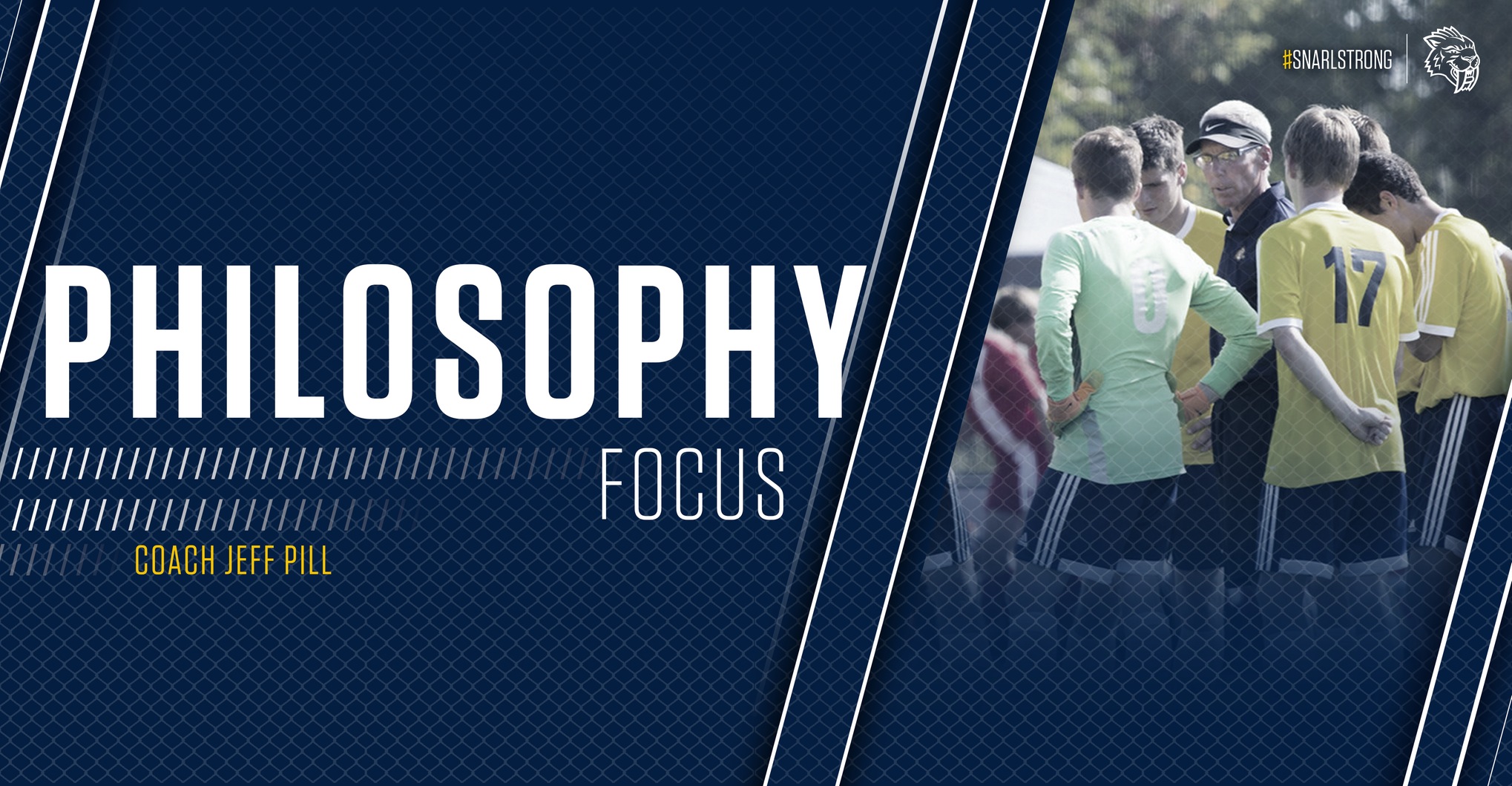
Philosophy Focus: Jeff Pill
WATERTOWN, Wis. -- Coach Jeff Pill led Maranatha to its first-ever NCCAA Men's Soccer national championship in 2014 - an accomplishment that he and the team relished. But Coach Pill and the team view success on the field as a byproduct. It's secondary to development - development in skill and development in Christlikeness.
In their minds, striving to be the best in the NCCAA DII is a top priority. But being their best as a team? And as individuals? That's a little more important. Ask the coach; ask the players. They will say the same thing.
It's what Coach Pill instills in everyone, and it's what the team itself has created as a daily culture.
"[The goal for student-athletes] is to be the best soccer player that they are capable of," said Coach Pill. "Perhaps that will even lead to winning a national championship again. But if we fall short of that goal, there are other goals which are equally compelling: commitment to the team and to the process of development."
COMMITMENT TO CORE BELIEFS
During the 2012 preseason, the team constructed a pyramid model of core beliefs. Each season, Pill and the senior team members teach, reinforce, and hold each other accountable to it on a daily basis.
"The pyramid resulted from discussions by the entire team during pre-season a few years ago," Pill said. "We, as coaches, initiated the process by asking, 'What does Scripture tell us about how we are to conduct ourselves as Christian athletes? What should we strive for as believers? What should we believe in and commit ourselves to?' Though a few guys shaped the process, the entire team contributed from the beginning.
"It's an all-encompassing document," Pill continued. "It speaks to how an MBU soccer player should approach his involvement with the team."
The document is equally applicable to every team member, no matter where their name appears on the depth chart at the time.
"It is process-centered, emphasizing that the pursuit of excellence starts with managing little things," Pill said. "It focuses on qualities of the heart, mind, and action, with the ultimate goal of becoming Christlike in all of our pursuits. In attempting to be the best player that we can, we realize that the process takes discipline and focus."
REINFORCING THE CORE BELIEFS
Teaching the core beliefs to new team members is something that Pill and the team do very intentionally.
"Each year we review the document," Pill said. "We assign the blocks to individuals, and it is their responsibility to make sure that the element they are teaching 'comes alive' for the other members of the team."
The team does this during the preseason, when they hold team meetings in the classroom, giving the players a rest from on-field training. Pill requests that his players do more than just quote each block.
"We ask them to break each element down to 'observable, measurable behaviors' so that it becomes connected with how they deport themselves. It's not just a theoretical document. Then, we review the document in order to see if it is still meeting the needs that it was intended for."
Then, the rubber meets the road when the team gets into the swing of the season.
"We strive to live it out," said Pill. "We refer to it constantly during training time, games, and off of the field. Sometimes it's done with humor, while other times we may have a team meeting if we have cases of non-adherence. We will even pause and reflect when we observe a particular individual serving as a stellar example. We use those moments to celebrate."
The reinforcing becomes even more formal when core beliefs affect players' self-evaluations, their peer evaluations, and the team awards at the end of the season.
"You get what you honor," Pill said. "Our team awards are built around these core beliefs."
CAPTAINS, LEADERSHIP, and THE ATHLETICS PLATFORM
Not only are team members given input into the evaluation and teaching of the core beliefs, but they also have input on the captain-selection process.
"Our usual practice is to have the players vote for who they think would be a good captain," Pill said. "The arm-band signifies a formal leadership position on the team and its good to have the position designated. Often, a player is more comfortable talking with a captain before he comes and talks with the staff. As a coach, I count on [the captain] to give us feedback and to share their ideas about the team's growth from their perspective.
"But we also realize that the team may have many effective leaders and that you don't have to have the arm-band to be an effective leader."
----
"Being an athlete is a unique endeavor," Pill said. "Your efforts are public, open for all to see. It is done in a context where there is an opponent who is trying their best to make you 'mess up'. Everyone is able to see your shortcomings and your successes. Because you are representing not only yourself and the team, but also the school and, ultimately, Christ, it makes the experience that much more compelling. As a result, each athlete, if they allow themselves to, is able to learn a lot about their character and commitment. It's a sacred endeavor in many ways.
"We have a common bond in our love for our Savior. And we see our involvement in athletics as an opportunity to serve Him who has loved us so much."










































































































